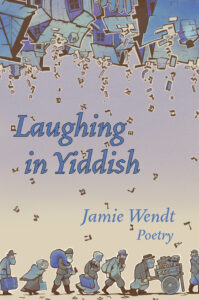 Reviewed by Susan Blumberg-Kason
Reviewed by Susan Blumberg-Kason
Jamie Wendt is an award-winning poet, a prolific book reviewer, and a middle school teacher based in Chicago. Her latest collection of poetry, Laughing in Yiddish, was a finalist for the 2022 Philip Levine Prize in Poetry and a semifinalist for the 2023 Word Works Washington Prize, the 2022 Longleaf Press Book Contest, and the 2022 Brick Road Poetry Press Book Contest.
Several themes run through Wendt’s new book. Immigration is a big one and it’s chilling to think that Wendt wrote these poems several years before the latest immigration and refugee crises, not just in the U.S., but around the world. On the nightly news, immigration is often framed as a means for better economic opportunities or to flee violence. Wendt’s poems dig deeper and present a human side to immigration, including the desperation many immigrants struggle with when they flee for their lives. More than few of her poems refer to the 1903 Kishinev pogrom, in today’s Moldova and one of the most deadly during the last years of czarist Russia.
The title of the collection comes from a poem with the same name about a Jewish immigrant who has recently settled in Chicago after leaving the Pale of Settlement, or the parts of Russia and Eastern Europe where Jews were forced to live over a century ago. In this poem, Wendt writes of the protagonist:
I tried leaving behind
the tall wooden shul, tried not to look back at burning cypress.
I tried laughing in Yiddish in Chicago.
Tried erasing G-d’s silence like sunshine dries a rain puddle.
Ten years have passed since we left. I cannot hold steady
on the subway. Every day, I stumble underground.
Wendt also memorializes the 8000 Jews murdered in Lithuania during World War II in her poem, “Kuziai Forest, Lithuania, Summer, 1941”. The poem appears on paper as narrow as a grave and begins:
Where death is
quick, there is
little story. Pit
by victim shovels.
Dig your own.
Thousands of Jews
facing the firing
squad, a mass
grave, easy to miss,
if you continue
through the forest
of Europe
toward iron gates,
into ghost chambers.
Museum of screams.
As in many immigrant communities, supernatural entities are often used to explain the unknown and in Eastern European Jewish folklore the golem plays a prominent role. Wendt mentions the golem in a number of poems and in “Why We Need the Golem”, she writes that in her mind the golem must be a woman who protects Jews trying to survive violence and that the golem’s Yiddish laughter provides reprieve.
Chicago also features prominently in Wendt’s poems and for the most part cover the decades starting from the turn of the last century to the 1960s. A couple of poems are set in the Maxwell Street market, once a center of Jewish life in Chicago. In “Peddler,” Wendt describes the Maxwell Street of her forebearers.
Out of his cart, Meyer sold clothing, fabrics, spools of thread.
A kesselgarden, they called it, or the Ellis Island of the Midwest—
Rainbow rows of vegetables and fruit, bedding and rags,
Hats and Yiddish newspapers, tools and used appliances.
Peddlers shouted prices from peregrine pushcarts.
A later poem, “Ode to Maxwell Street”, shows how the old market has changed, becoming more of a center of entertainment with street musicians, including the Blues. She also writes of the construction of the Eisenhower Expressway, or I-290, that displaced immigrants and refugees from their homes on the Near West Side, where Maxwell Street is located. Readers need not be familiar with Chicago to understand this displacement.
Laughing in Yiddish is a beautiful collection and is special because Wendt memorializes many pieces of history—from Kishinev to Chicago—that are in jeopardy of being lost. Her book is also a testament to resilience of immigrants and how hard they work to build a new a life for their families, all while shouldering the traumas they left behind.
Laughing in Yiddish by Jamie Wendt
Broadstone Books, 2025, $25.00
ISBN 9781956782967
Susan Blumberg-Kason is the author of Bernardine’s Shanghai Salon: The Story of the Doyenne of Old China, a 2023 Zibby Awards finalist for Best Book for the History Lover. She is also the author of Good Chinese Wife: A Love Affair with China Gone Wrong and the 2024 Zibby Awards winner When Friends Come From Afar: The Remarkable Story of Bernie Wong and Chicago’s Chinese American Service League. She is the co-editor of Hong Kong Noir and a regular contributor to the Asian Review of Books, Cha: An Asian Literary Review and World Literature Today. Her work has also appeared in the Los Angeles Review of Books and PopMatters.
